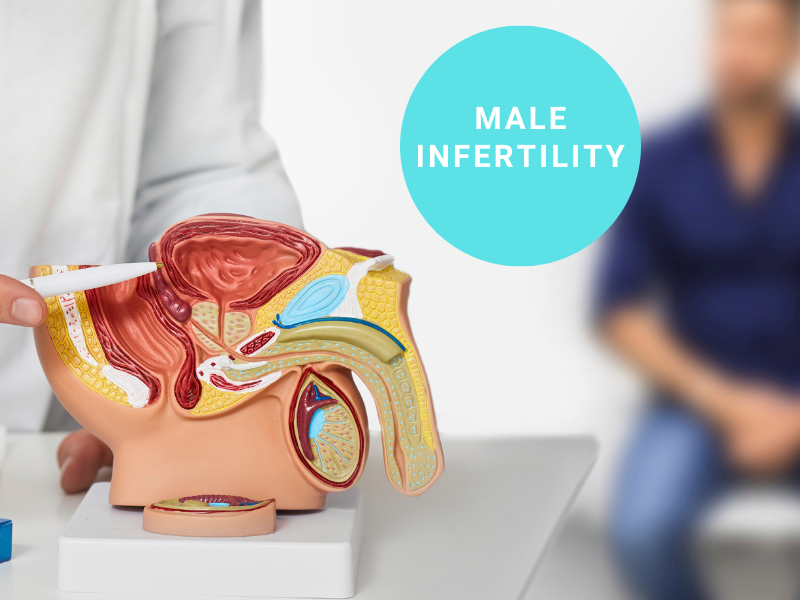Male Infertility

Male infertility is a condition where a man )assigned male at birth) has a lower chance of impregnating a person assigned female at birth (AFAB) due to various health issues.
Causes of Male Infertility
Male infertility is dependent on various factors. You should be able to:
· Produce healthy sperm capable of fertilizing the egg.
· Problems with either of these may indicate infertility.
· Have an erection and ejaculate to ensure the sperm reaches the egg.
The following are some of the leading reasons for male infertility.
1. Sperm problems like:
· Low sperm counts
· Malformed sperm
· Absence of sperm in the semen
· Poor sperm motility
2. Infections
· Sexually transmitted infections like HIV and gonorrhea
· Orchitis
· Epididymitis
3. Medical conditions
· Diabetes
· Cystic fibrosis
· Autoimmune disease
4. Structural problems
· Scar tissue from surgery
· Swollen veins in the scrotum
5. Lifestyle Choices
· Smoking
· Alcohol consumption
· Drug use
· Obesity
6. Environmental causes
· Heavy metal exposure
· Extended exposure to industrial chemicals
· Exposure to radiation
Symptoms of Male Infertility
The primary symptom of male infertility is the inability to conceive a child. Emotional and psychological symptoms include:
· Depression
· Grief
· Failure
Risk Factors for Male Infertility
Several factors can increase a man’s risk of infertility. These include:
1. Age: Men over 40 have a higher risk of infertility.
2. Smoking: Smoking can reduce sperm production and function.
3. Alcohol Consumption: Excessive alcohol consumption can affect sperm production and function.
4. Drug Use: Drug use can negatively impact sperm production and function.
5. Exposure to radiation and toxins: Exposure to toxins such as lead and pesticides can affect sperm production and function.
Other risk factors include:
· Having a body mass index greater than 25.
· Spending a lot of time in heat raises the temperature of your testicles.
· Having suffered injuries to the testicles.
· Have a history of undescended testicles.
· Having a previous vasectomy or significant abdominal or pelvic surgery.
· Having a blood-related or being born with a reproductive condition
Diagnosis of Male Infertility
Diagnosis of male infertility involves the following:
· Semen analysis: Evaluates sperms and semen quality, including volume, motility, and morphology, typically done with at least 2 samples.
· Blood tests: Check hormone levels and identify other potential issues.
· Other tests: Imaging like ultrasound examines testicles, blood vessels, and scrotal structures.
· Testicular biopsy: If semen analysis reveals low or no sperm, a biopsy may be done to examine testicular tissue under a microscope.
Treatment of Male Infertility
The treatment depends on the cause of your infertility. Some of the common treatments include:
1. Medications: Medications can be used to treat infections, hormonal imbalances, and erectile dysfunction.
2. Surgery: Surgery to address issues that prevent sperm from being produced, developed, or ejaculated.
3. Assisted Reproductive Technologies (ART): ART helps couples conceive. This includes procedures like:
· In vitro fertilization (IVF)
· Intracytoplasmic sperm injection (ICSI)
· Artificial insemination
Male Infertility Prevention
Male infertility is not always preventable. However, you can try to avoid some common causes of male infertility.
· Do not smoke.
· Avoid unlawful drugs.
· Limit or abstain from alcohol.
· Maintain a healthy body weight.
· Avoid substances that cause extended heat in the testicles.
· Don’t undergo a vasectomy.
· Avoid pesticides, heavy metals, and other poisons.
· Reduce stress



